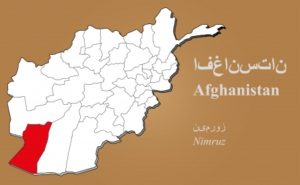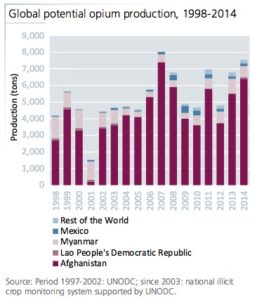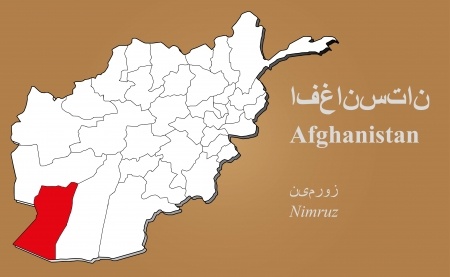 Reporting for The New York Times, Azam Ahmed described a successful raid by Afghan special operations forces on July 12, 2014. Two vehicles were intercepted in the desert of southern Nimruz Province in Afghanistan. They were attempting to deliver a cache of weapons and drugs from Helmand Province to Nimruz Province. They seized a metric ton of opium, three AK-47 assault rifles, a PKM machine gun, a rocket-propelled grenade and a man who was the Taliban shadow governor of Nimruz Province, Mullah Abdul Rashid Baluch.
Reporting for The New York Times, Azam Ahmed described a successful raid by Afghan special operations forces on July 12, 2014. Two vehicles were intercepted in the desert of southern Nimruz Province in Afghanistan. They were attempting to deliver a cache of weapons and drugs from Helmand Province to Nimruz Province. They seized a metric ton of opium, three AK-47 assault rifles, a PKM machine gun, a rocket-propelled grenade and a man who was the Taliban shadow governor of Nimruz Province, Mullah Abdul Rashid Baluch.
Rashid was said to embody the changing face of the Taliban in Afghanistan. He’s held leadership, logistical and financial support roles for the Taliban since at least 2007. By mid-2013 he was serving as a liaison officer to al-Qa’ida (AQ), arranging planning meetings between Taliban senior leadership and AQ members in Karachi, Pakistan.
In mid-2013, Rashid ordered the emplacement of an improvised explosive device (IED) in Nimruz Province which resulted in an explosion that killed one U.S. soldier. Additionally, Rashid transported IEDs to Afghanistan that were used by the Taliban to target Coalition Forces. As of early 2008, Rashid and a Taliban associate facilitated the movement of three suicide bombers for attacks in Nimruz Province. He has also played a role in the deployment of suicide bombers to conduct vehicle-borne IED attacks on senior Afghan government officials and non-governmental organization workers.
Rashid was also involved in multiple narcotics-related financial activities, including delivering funds collected from narcotics traffickers to Taliban commanders. He collected payments for the coordination of Taliban protective services for narcotics shipments and disbursed payments to Taliban subordinates. Azam Ahmed commented that picking him up during a drug raid, and not a counterterrorism operation, was a fitting end. “He was, in the eyes of many, more of a criminal than an insurgent ideologue.” Rashid is now serving an 18-year prison sentence.
Mullah Rashid is just one of dozens of senior Taliban leaders who are so enmeshed in the drug trade that it has become difficult to distinguish the group from a dedicated drug cartel. While the Taliban have long profited from the taxation and protection of the drug trade in Afghanistan, insurgents are taking more direct roles and claiming spots higher up in the opium chain, according to interviews with dozens of Afghan and Western officials, as well as smugglers and members of the communities where they reside.
According to UN monitors, the new Taliban leader, Mullah Akhtar Muhammad Mansour, has amassed a huge personal fortune from sitting at the top of a hierarchy of tribal drug traffickers. Reportedly, he used some of his drug money to buy off rivals when he claimed the supreme leadership of the Taliban in the summer of 2015. “This trend has real consequences for peace and security in Afghanistan, as it encourages those within the Taliban movement who have the greatest economic incentives to oppose any meaningful process of reconciliation with the new government.”
In “How Opium Profits the Taliban,” a report for the United States Institute for Peace, Gretchen Peters described how the poppy trade has played a critical role in bankrolling the Taliban and corrupting and destabilizing the Afghan government. When the U.S. invaded Afghanistan in October of 2001, a Taliban ban on poppy cultivation had been in place for fifteen months. Throughout the southern part of Afghanistan, there were essentially no poppy fields under cultivation. Most of the 185 metric tons of opium produced in Afghanistan that year came from northern provinces outside of Taliban control. However, by 2008, nearly 98 percent of the Afghan poppy crop was grown in six southern and southwestern provinces, Farah, Helmand, Kandahar, Nimroz, Uruzgan, and Zabu.
The 2015 World Drug Report said that in 2014 opium cultivation for Afghanistan was at its highest level since estimated first became available. Global opium production was at the second highest level since the late 1930s. The following graphic, taken from 2015 World Drug Report, puts the significance of Afghan poppy cultivation in context. Except for the one-year anomaly due to the Taliban’s temporary ban on poppy cultivation, Afghanistan has been the largest worldwide producer of opium by a large margin since at least 1998.
 The 2015 Afghanistan Opium Survey, from the same UN Office on Drugs and Crime, reported that in 2015 there was a 19% decrease in the total area under opium poppy cultivation. But it was still the fourth highest level since the estimations began in 1994. The Fix reported Afghanistan produces 85% of the world’s supply of heroin and morphine, an estimated 380 tons annually. It’s worth an estimated $4 billion.
The 2015 Afghanistan Opium Survey, from the same UN Office on Drugs and Crime, reported that in 2015 there was a 19% decrease in the total area under opium poppy cultivation. But it was still the fourth highest level since the estimations began in 1994. The Fix reported Afghanistan produces 85% of the world’s supply of heroin and morphine, an estimated 380 tons annually. It’s worth an estimated $4 billion.
In “How Opium Profits the Taliban,” Gretchen Peters described how the drug trade became a central part of the Taliban’s Afghan activities. She said many people who encountered the Taliban at their beginnings said they were well intentioned, “even if their methods were medieval.” Their initial commitment to stamp out the opium trade was dropped as the need for funds overcame their original objectives. She said the Taliban’s rise to power had more to do with their reliance “on the financial backing of an unholy alliance of drug smugglers, traders, and trucking groups” than the grace of Allah, as they claimed.
She concluded that while opium has played a long-standing supportive role in the Afghan conflict, “today the drug trade has moved to center stage.” Not only have narcotics corrupted the Afghan government, they have begun to transform the nature of the insurgency “from one based on ideology to one increasingly driven by profit.”
It is crucial that the international community stop thinking of Afghanistan’s drug problem as Afghanistan’s drug problem. The poppy may be grown there and processed into morphine base or heroin along the border, but to a significant degree, the southern Afghan poppy trade is managed from Pakistan. Drug profits get laundered between Karachi and the United Arab Emirates, and U.S. financial crime experts who have studied the trade believe some funds end up in Western banking institutions. A successful strategy to combat the issue must take into account both the multinational nature of the opium trade and work to dismantle financial flows keeping insurgent fighters funded and armed.
Peters argued that the best strategy against the Taliban is not to try and wipe them out militarily, but to make them irrelevant, by offering Afghans and Pakistanis a better alternative. “The ultimate goal should not be the end of the Taliban and al-Qaeda, but the creation of a prosperous and stable Afghanistan and greater region.” And this will mean helping the locals grow a better cash crop then opium poppies.





